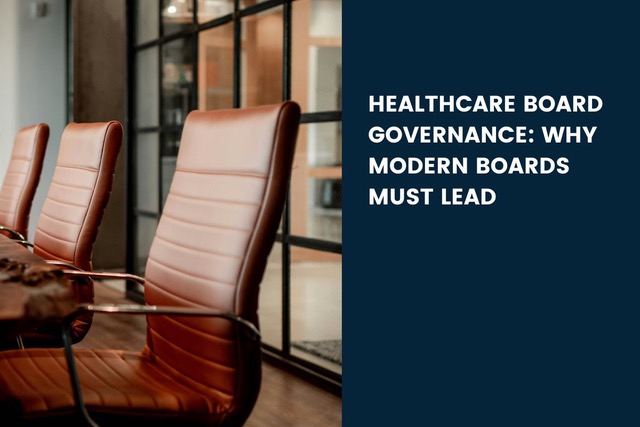The New Demands of Healthcare Board Governance
In 2025, the pressures on healthcare organisations are mounting. These include:
- Aged Care Reform: Boards must ensure readiness for reforms that redefine funding, standards, and accountability.
- Workforce Burnout: Leadership must play an active role in retention strategies, culture reform, and staff wellbeing.
- Digital Disruption: Emerging technologies like AI and telehealth require governance that balances innovation with ethical integrity.
- Regulatory Complexity: With increasing scrutiny from state and federal regulators, boards must remain agile and informed.
- Community Accountability: Boards in healthcare and community sectors are held to higher standards of cultural safety, inclusiveness, and transparency.
To navigate these pressures, healthcare board governance must evolve beyond risk management. It now demands:
- Sector Fluency – Deep understanding of health policy, funding reform, clinical safety, and patient-centred care.
- Strategic Courage – Directors must challenge constructively, engage in transformation, and contribute diverse external perspectives.
- Lived Experience and DEI – Board diversity is more than a metric—it’s a prerequisite for trust, especially in community-facing roles.
Why Board Composition Matters Now More Than Ever
Leading bodies such as the Australian Institute of Company Directors (AICD) consistently highlight that high-performing boards in regulated sectors must be strategically constructed.
In healthcare board governance, this means:
- Ensuring representation across finance, clinical governance, digital transformation, and social impact.
- Building agility to steer executive teams through ambiguity, policy shifts, and reputational challenges.
- Aligning governance with the diverse populations they serve—including First Nations, CALD, and LGBTIQ+ communities.
At Galvin-Rowley Executive, we work closely with boards to map and recruit directors who can bring breadth, depth, and cultural intelligence to governance. The trend is clear: boards with multidisciplinary, values-aligned composition govern better and lead stronger.
When Passion Isn’t Enough: Governance Capability in NFP and Community Boards
In the NFP and community health sectors, boards are often filled with passionate, well-intentioned individuals. But passion alone cannot replace strategic governance.
We’ve seen firsthand:
- Boards lacking financial or digital oversight experience
- Ambiguity around the line between strategic governance and operational interference
- A commitment to diversity in principle, but not in lived governance practice
- Passionate directors who are reactive, under-supported, and stretched too thin
Healthcare board governance must bridge passion with performance. As one Chair from a disability services provider shared:
“We had the heart, but not the head. That changed when we broadened the skill mix.”
Good governance does not eclipse purpose—it protects it.
What Leading Boards Are Doing Differently
Progressive boards in the healthcare and life sciences sectors are adapting in clear, measurable ways:
- Embedding Strategic Foresight: Reviewing board capability matrices annually and identifying skill gaps related to digital health, ESG, and sector transformation.
- Fostering Inclusive Governance: Appointing directors with lived experience, ensuring board conversations reflect the communities served.
- Strengthening Committee Structures: Redesigning audit, risk, and clinical governance sub-committees to address sector-specific oversight needs.
- Prioritising Board Development: Engaging in board-level education and performance reviews to uplift collective governance acumen.
These are no longer optional. They are the new standards of effective healthcare board governance.
The Role of Executive Search in Board Evolution
At Galvin-Rowley Executive, we support boards to not only find directors—but the right directors. We:
- Conduct capability and diversity mapping against future sector challenges
- Engage discreetly with emerging and established leaders across clinical, commercial, digital, and governance domains
- Ensure cultural alignment and lived values, not just impressive CVs
We believe that in complex sectors like health and life sciences, appointing to a board is not about who you know, but who your future needs.
Contact Us
Rebecca Perrone
Practice Lead – Healthcare & Life Sciences
0401 933 330
rebecca@galvinrowley.com.au





